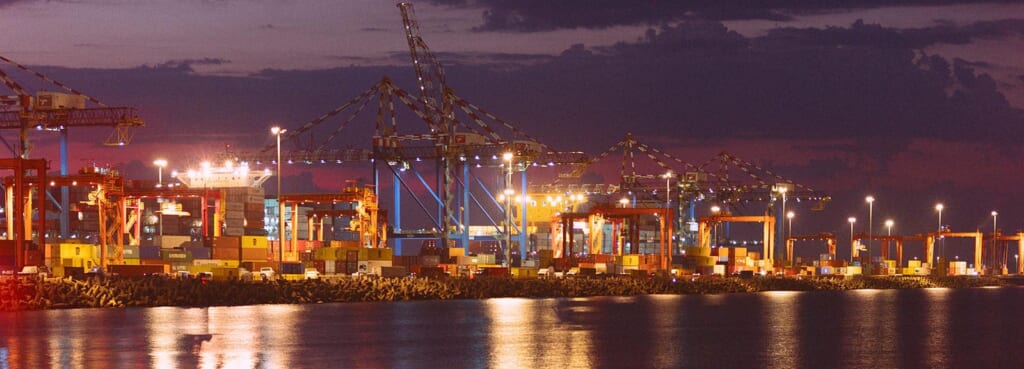Dubai’s ports connect businesses to more than 200 markets, its customs systems are among the fastest in the world, and its location bridges Asia, Africa, and Europe. For business owners looking to expand through international trading, the city offers a level of access and efficiency that few places can match.
Yet, while opportunity is wide open, the way you set up your company can make or break your success. Every trader needs a license, but more importantly, every trader must decide which structure their license sits under. A free zone company, a mainland company, or an offshore entity each comes with different rules on ownership, compliance, customs access, and taxation. Choosing one structure over another changes how you operate on the ground, who you can sell to, and how much profit you keep after expenses and taxes.
In this blog, we will cover what an import export license in Dubai actually means, how to get import export license in UAE, what the import export license cost in Dubai looks like, and how different structures such as free zone, mainland, and offshore compare. We will also break down which setup is best for different types of businesses, explain compliance and customs requirements, outline taxation considerations, highlight the risks of choosing the wrong structure, and share best practices for ensuring long-term success.
Table of Contents
What Is an Import Export License in Dubai?

An import export license in Dubai is the official government authorization that allows a business to legally trade goods across borders. It is a mandatory document for any company intending to import products into the UAE or export products to other countries. Without this license, a business cannot engage in cross-border trade under UAE law.
Definition and Purpose
The import export license in Dubai formally identifies the company as a recognized trader. It ensures that the business meets legal requirements, complies with local regulations, and can interact with customs authorities for the clearance of goods. This license is tied to the company’s registration, which determines under which legal framework the trading activities can occur.
Scope of the License
The license specifies the types of goods that a company is allowed to trade. It may cover:
- General Trading: Multiple product categories under one license.
- Specific Goods: Limited to particular items such as electronics, food products, textiles, or industrial materials.
The scope outlined in the license determines what can be legally imported or exported, and customs authorities strictly enforce it.
Legal Requirement
Obtaining an import export license in Dubai is not optional. All businesses engaged in international trade must hold a valid license to avoid penalties, fines, or the suspension of trading activities. It serves as proof that the company is legally authorized to operate in the international market and comply with UAE trade regulations.
How to Get Import Export License in UAE
Obtaining an import export license in Dubai requires a clear understanding of the legal steps and documentation needed to operate a trade business. The process ensures that companies meet regulatory standards and are authorized to import and export goods legally.
Step 1: Choose Your Company Structure
Before applying for the license, you must decide whether your business will be a mainland company, a free zone entity, or an offshore company. The structure determines which authority you will approach for the license, the type of activities allowed, and the level of access to local and international markets. And this guide will help you choose the right jurisdiction for your business.
Step 2: Submit Required Documentation
The authorities require specific documents to issue the license:
- Valid passport copies of shareholders and managers
- Proof of residence or UAE visa
- Completed application form for the license
- Memorandum of Association (MOA) and Articles of Association
- Business plan or description of trading activities
The documents are reviewed to confirm that the business complies with UAE trading laws.
Step 3: Apply Through the Relevant Authority
- Mainland companies: Applications are submitted to the Dubai Department of Economy and Tourism (DET).
- Free zone companies: Each free zone has its own authority responsible for issuing the import export license.
- Offshore companies: While offshore entities primarily operate internationally, licenses may be obtained through registered agents for trade activities outside the UAE.
Step 4: Register with Dubai Customs
After receiving the license, registration with Dubai Customs is required. This step enables your company to clear imported goods, obtain customs approvals, and comply with import-export regulations.
Step 5: Receive the Import Export License
Once the application and registration process is complete, the import export license in Dubai is issued. The license lists the allowed trade activities, specifies the types of goods, and identifies the legal entity permitted to conduct trade.
Common Points to Consider
- The license must be renewed annually to remain valid.
- Any change in ownership or trading activity must be reflected in the license.
- Authorities may request updated documents during renewal or audit processes.
Import Export License Cost in Dubai

Understanding the import export license cost in Dubai is crucial for planning a trading business. Costs vary depending on the company structure, trade activities, and the authority issuing the license. Knowing the breakdown helps business owners budget effectively and avoid unexpected expenses.
License Fees by Company Structure
- Mainland Companies: Fees typically start from AED 15,000 to AED 25,000 annually, depending on the business activity. Additional costs may include trade name registration, office rent, and government approvals.
- Free Zone Companies: Free zone authorities offer packages ranging from AED 12,000 to AED 20,000 per year. Some free zones also include visa quotas and access to warehouses in the fee.
- Offshore Companies: Offshore licenses are generally lower in cost, starting around AED 10,000. However, offshore entities cannot conduct physical trade inside the UAE.
Additional Costs
- Dubai Customs Registration: Registering your company for customs clearance typically costs a few thousand dirhams, depending on the type of goods and business volume.
- Visa Fees: If your business requires employee visas, additional costs apply.
- Office or Warehouse Rent: Certain structures, especially mainland companies, require a physical office, which adds to the overall cost.
4.Document Attestation and Translation: Some trade licenses require MOA, agreements, or contracts to be attested and translated into Arabic.
Factors Affecting License Cost
- Type of trading activity (general trading vs. specialized goods)
- Location of registration (mainland vs. specific free zones)
- Number of shareholders and visa requirements
- Any additional services such as warehousing, logistics, or customs facilitation
Business Structures for Import Export in Dubai
Dubai primarily offers three structures: mainland companies, free zone companies, and offshore entities.
Mainland Company
A mainland company is registered under the Dubai Department of Economy and Tourism (DET) and allows full access to the local UAE market. Businesses with a mainland setup can obtain an import export license in Dubai that enables direct trading with UAE customers as well as international markets.
- Ownership: Typically requires a local partner holding 51% of shares unless specific exemptions apply.
- Operations: Can trade across Dubai and other Emirates without restrictions.
- Compliance: Must adhere to corporate tax rules, VAT, and customs regulations for imports and exports.
Mainland companies are suitable for businesses that intend to sell products directly within the UAE while also exporting goods abroad. Here’s a guide on how to set up the right way in Dubai Mainland.
Free Zone Company
Free zones in Dubai provide 100% foreign ownership and simplified setup processes. Companies registered in free zones can obtain an import export license in Dubai through the respective free zone authority.
- Ownership: Full foreign ownership allowed.
- Operations: Ideal for re-exporting goods or trading internationally. Direct sales in the UAE require a local distributor.
- Compliance: Free zone regulations apply, and customs registration is required for goods entering or leaving the UAE.
Free zone companies are popular among e-commerce businesses and international trading firms that do not need direct access to UAE consumers.
Offshore Company
Offshore companies are registered primarily for international trade and holding purposes. While they can have an import export license in Dubai for cross-border transactions, they cannot trade physically within the UAE.
- Ownership: 100% foreign ownership permitted.
- Operations: Restricted to international markets; cannot lease office space or sell directly in Dubai.
- Compliance: Offshore regulations are minimal, and registration is usually through a registered agent.
Offshore structures are suitable for businesses that require a legal entity for international contracts, profit repatriation, or asset protection without local trading operations.
Which Structure Fits Different Types of Trade Businesses?

Not all trade businesses have the same operational needs, and the type of company you choose affects how your import export license in Dubai can be used. Different business models benefit from different structures depending on whether they focus on general trading, e-commerce, or specialized goods.
General Trading Companies
Mainland setups suit businesses trading multiple categories under one license, allowing sales inside and outside the UAE. Free zones work better for re-exports.
E-Commerce & Cross-Border Trade
Free zones are ideal for online sellers, offering smooth customs clearance, full ownership, and warehousing for global shipping without a retail presence. An import export license in Dubai makes international fulfillment much simpler.
Specialized Industry Goods
Food, pharma, electronics, or luxury products can operate in both structures. Mainland allows direct UAE sales, while free zones usually need local distributors, with strict compliance required.
Service-Based Trade Support
Logistics, freight, or brokerage firms still need an import export license in Dubai to legally manage shipments and customs for clients.
Compliance and Customs Considerations
Operating under an import export license in Dubai requires full adherence to UAE’s compliance and customs regulations. Non-compliance can result in fines, shipment delays, or even suspension of the license.
Customs Registration
Every business holding an import export license in Dubai must register with Dubai Customs. This registration is essential for:
- Clearing imported goods through UAE ports.
- Exporting goods from Dubai to international destinations.
- Obtaining customs approvals and permits for restricted items.
Customs registration assigns the company a unique code, which is referenced on all shipping documents.
Documentation Requirements
Compliance requires maintaining accurate documentation for all shipments. Key documents include:
- Commercial invoices listing the goods and their values
- Packing lists detailing quantities and weights
- Certificates of origin for products, when required
- Import or export permits for regulated items, such as pharmaceuticals or electronics
These documents are reviewed by customs authorities during inspections, and errors can lead to fines or delays.
Tariffs and Duties
Although some free zones allow duty-free imports for re-export, mainland companies must account for import duties on certain goods. Duties vary depending on the product category and origin.
Regulatory Compliance
Holding an import export license in Dubai also requires adherence to UAE trade laws and regulations. Businesses must:
- Avoid trading restricted or prohibited goods
- Ensure all labeling and safety standards are met
- Update the license if trade activities or product types change
Taxation and Financial Implications

Holding an import export license in Dubai comes with financial responsibilities, including taxes, VAT, and other reporting obligations.
Corporate Tax
Mainland companies pay 9% corporate tax on profits above AED 375,000. Free zone firms may qualify for exemptions if they follow regulations and avoid mainland trade. Offshore companies generally pay no UAE corporate tax on international activities.
Value-Added Tax (VAT)
Businesses importing or exporting goods under an import export license in Dubai must comply with UAE VAT laws. Key points include:
- VAT is charged on imported goods entering the UAE at the applicable rate.
- Exports are generally zero-rated, meaning VAT is not applied, but proper documentation must be maintained.
- Companies must register for VAT if annual taxable supplies exceed AED 375,000.
Customs Duties
Free zone companies can import duty-free if goods are re-exported, while mainland companies pay duties based on product type and origin.
Financial Reporting
Companies must keep accurate records of imports, exports, invoices, and financial statements. Proper reporting ensures compliance, prevents fines, and maintains access to banking services.
Risks of Choosing the Wrong Structure
Selecting the wrong company structure for your import export license in Dubai can have long-term consequences. Each structure (mainland, free zone, or offshore) has limitations, and misalignment with your business model can create operational and legal challenges.
Limited Market Access
A free zone company targeting UAE consumers cannot trade directly in the mainland. The import export license in Dubai may require local distributors, slowing growth.
Compliance Challenges
The wrong structure complicates adherence to customs, VAT, and corporate tax rules. Mainland licenses offer full market access but come with stricter reporting requirements. Non-compliance can lead to fines, license suspension, or delays in customs clearance.
Higher Operational Costs
Offshore companies may need extra arrangements to trade internationally, increasing logistics, legal, and administrative costs while limiting the effectiveness of the import export license in Dubai.
Licensing Restrictions
Each structure restricts certain business activities. Choosing incorrectly can prevent the import export license in Dubai from covering intended goods or services, and changing the setup later can be costly and time-consuming.
Investor and Partner Risks
Investors and partners evaluate companies based on structure and license. The wrong setup can reduce credibility, limit financing, and hinder strategic partnerships, especially for international trade under the import export license in Dubai.
Selecting the right company structure is only the first step. Then comes the legal structure of your business, which defines ownership, liability, and governance. If you want to avoid the risks of selecting the wrong legal structure, we recommend reading this article on how to choose the right legal structure for your company.
Best Practices for Long-Term Success in Import Export Business
Holding an import export license in Dubai is just the start. Long-term success requires consistent compliance, careful planning, and operational efficiency.
Keep Licenses Updated
Renew your license on time and update it if trading activities, ownership, or structure change. Staying current ensures your import export license in Dubai remains valid.
Maintain Accurate Records
Keep precise records of invoices, shipping documents, and customs paperwork. Proper documentation supports compliance and smooth operations.
Understand Customs Regulations
Correctly classify goods with HS codes, stay informed on duties and permits, and ensure customs procedures are followed to avoid delays.
Plan Financial Obligations
Track VAT, corporate tax, and other financial requirements to prevent fines and maintain smooth trade under the import export license in Dubai. And if you find corporate tax registration complicated like most people, read this blog where we simplify corporate tax in the UAE.
Build Strong Partnerships
Work with reliable suppliers, distributors, and logistics providers to streamline operations and fully leverage your license.
Train Your Team
Ensure employees understand compliance rules and documentation procedures to maintain proper use of the import export license in Dubai.
Now that you know the best practices, there are 8 common challenges most businesses face when setting up in the UAE. Here’s how to navigate through them to stay compliant and avoid fines.
Conclusion

An import export license in Dubai is essential for any business trading internationally. It ensures legal compliance, enables smooth customs operations, and allows access to global markets.
But choosing the wrong structure can create compliance risks, increase costs, and limit growth. Without proper guidance, even experienced businesses may struggle to optimize their license and trading setup in the UAE.
At GCG Structuring, we help businesses secure the right import export license in Dubai, select the most suitable structure, and stay fully compliant. With the right support, you can reduce risks, streamline operations, and confidently grow their international trade business.
FAQ
1. 0 Can a new business apply without a local partner?
Yes, free zone and offshore setups allow 100% foreign ownership, while mainland companies may require a local partner.
2. 0 How long does it take to get the license?
Free zone licenses can take a few days, mainland licenses usually 2–4 weeks depending on documentation.
3. 0 Can one license cover multiple product categories?
Yes, general trading licenses cover multiple categories, but specialized goods may need separate approvals.
4. 0 Do I need separate licenses for each free zone?
Yes, each free zone requires its own license.
5. 0 Is the license transferable if ownership changes?
No. Ownership changes must be updated with the authority; the license is tied to the registered company.





